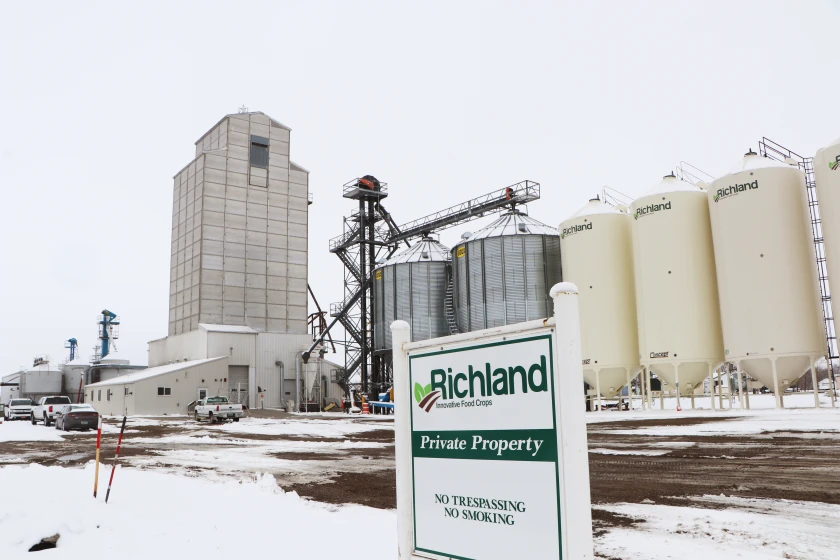Stranded specialty crop companies want ‘teeth’ in container rules to help fix supply chain backlog
13 April, 2022

U.S. Sen. Amy Klobuchar, D-Minn., and John Thune, S.D., are moving a bill in the Senate, designed to pressure international ocean freight companies to fill freight “containers” with agricultural products instead of sending them back to Asia empty. Rick Brandenburger, president of Richland Innovative Food Crops Inc., Inc., of Breckenridge, Minnesota, says the company is getting only one-third of their needed containers. They want “teeth” in any efforts to fix the problem.
Rick Brandenburger wants "teeth" in a bill moving through Congress that is designed to make shipping containers available to agricultural specialty crop exporters, instead of sending them back to Asia empty. There is a bill in place, but he worries it is simply window-dressing — unlikely to change anything.
Brandenburger is president of Richland Innovative Food Crops Inc., a company various agribusiness leaders started in 1999. Richland IFC develops, contracts and ships specialty food-grade crops — soybeans and corn — domestically and internationally. Company owners have export roots dating to 1979. Richland IFC has sold 200 containers per month, mostly in the 20-foot containers that are sold into Asia. The company has received an alarming declining percentage of containers ordered in recent months: November 2021, 68%; December 2021, 38%; January 2022, 28%; February 2022, 21%.
Economic power
The problem is that the ag export containers are “back-haul” load for containers that ship higher-valued goods into the U.S.
The “primary haul” are the trips into the U.S., which Brandenburger says costs shippers $10,000 to $25,000. Going back to Asia, ag exporters historically have paid about one-fourth the rate, currently about $3,500 per container (which includes trucking fees to the rail yard ).
In the past two years — especially in the past six months — shipping companies trying to serve strong U.S. demand for Asian products, apparently have made a financial decision to quickly send the containers back to Asia empty. This helps them serve U.S. consumers, but leaves exporters high and dry.
“It’s a classic economic model,” Brandenburger said. “They’re more profitable by refusing exports and returning them empty.”
If the delays and cancellations continue, it will devastate Richland IFC and other specialty crop exporters.
Jay Schuler, one of the founding shareholders Richland IFC, is the founder and chairman of a District Export Council of North Dakota and northwest Minnesota. He said ag product shipments had been strengthening until the past year and a half are now stranded without service.
“It’s gotten worse in the past six months,” Schuler said. “It’s had our export people pulling their hair out. Customers have contracted the product in Asia. They’re waiting for it. They need it. Their shelves are going empty.”
For Midwest farmers, the problem is biggest for specialty crop growers, shipping identity-preserved shipments. North Dakota ships numerous specialty crops — premium sunflower products, edible soybeans, dry edible beans, flax and others.
“It’s gotta change,” Schuler said. “We’re desperate. It can’t happen quick enough. U.S. legislation takes time, and in the meantime, value-added exports will be lost” to Brazil, Argentina, and Canada.
Under a third
Brandenburger said about 65% of Richland IFC’s revenue comes from shipping soybeans to eight Asian countries. Those markets account for nearly 2,000 containers per year. In the 2020-21 shipping season, they were getting 80% of what they needed. Four months ago, they were getting 50% of what they needed. Now, it’s down to 30%. A key export is "natto" soybeans, used for specialty Japanese markets.
When they don’t have containers to fill at their Dwight, North Dakota, processing plant, they simply store commodities, hoping the containers will become available.
Foreign buyers must either find out an alternate shipping method — which adds to their food inflation — or seek out suppliers from the company’s foreign competition. Richland IFC is just finishing its 2022 contracting season, hoping for a normal shipping year.
Schuler said one problem is that U.S. consumers have such pent-up demand for Asian-made consumer goods. Some of this has been attributed to COVID subsidies that put money in American pockets that is being used for imported items.
The companies make more money shipping containers back to Asia empty than they would if U.S. ag exporters filled them with soybeans and other crops, he said.
“The containers are loaded in Asia, with Barbie dolls in China or maybe TVs in Korea and are shipped on the containers,” Schuler said, dryly.
The containers come on the boat, loaded via rail to places like Chicago. When the process works, the containers are repositioned in Minneapolis, to be available to exporters. The ag export companies must send trucks to pick them up. Companies then fill them, sealed, and loaded back on a chassis to be driven back to Minneapolis to be transloaded onto a railroad “flatbed” car.
“Unfortunately, most of them are empty,” Schuler said. The ocean carrier lines tell the railroads to bring the containers back empty so they can pick up extra days — “a week or two, so they can get it back to China to fill it up with Barbie dolls," he said.
Three of the largest shipping consortiums control 80% of the container flow, Brandenburger said. The shipping lines now all are foreign-owned in Korea, the Netherlands or Germany. Two are based in Singapore, three are in Taiwan, Europe has three or four and China has two of them. None are American.
Source: www.agweek.com
TAG(s):
